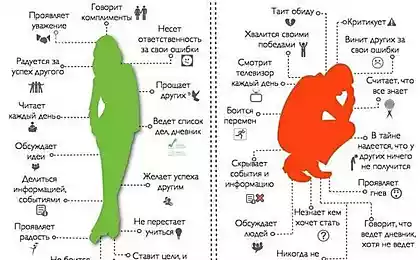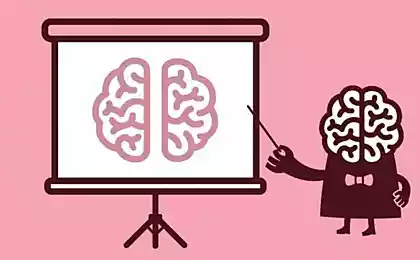
We are not told in school, university and work, or talk very little about how the brain works. And in order to work effectively, you need to know how to set your brain to work.
< Website I found a very sensible article on how to properly handle our brain - in it the author laid everything on the shelves.

h3>
1. The specific objective h3> Once you formulate for itself a specific goal, task - to immediately begin miracles. There will be money, resources and time to implement it. And if you put the main target will be able to divide it into components, and calmly, slowly, steadily, step by step will be to perform them - no problem in front of you can not stand.
2. Positive emotions h3> They encourage us to action. Start looking for the simple pleasures of life, and in the brain begin stimulation - the selection into the body of large doses of endorphins, hormones of pleasure and positive emotions means that increase your ability to live. It is human nature to seek happiness - is unnamed instinct for survival.
3. The movement and fresh air h3> Outdoors actively blood is saturated with oxygen, quickly carries it to the cells of the brain, strengthens the processes of oxidation, metabolism, is released as energy we need. The brain makes us move to save himself and us, of course.
4. Simple food in moderate amounts h3> Simple food is easier to obtain, prepare and digest. Particularly useful have soups. Brain says (unless you want to hear): "My friend, 50% of all the energy produced by the body, is spent on sight, 40% - for the digestion and decontamination of food toxins, and only 10% remains in the movement, the work of mental and nervous systems, fight with billions of microbes. If you eat all the time when we think ?! »
5. Sleep, rest h3> The brain, like the whole of the human body needs proper rest - sleep. Brain at night, you can give the installation: make a prediction, decision output, output to a pleasant dream. Unnecessary experience simply "washed off" night protecting brain waves.
6. Habituation h3> The brain can not immediately adapt to the rapid changes in any activity come gradually, quietly, getting used to it. Every day, doing the best you can achieve the impossible. Study habits, work produced gradually and continuously. Sudden understanding and insight always presupposes knowledge may not always be fully aware of. Instant results do not happen. For all - your time.
7. Freedom h3> This independence from the fears and stereotypes. Freedom is not afraid to think in their own way and in a new way, to defend their way of thinking, their lives, their appearance, their loved ones. Do not blame the whole world of misunderstanding and non-recognition of the extraordinary you. And allows others to be different you have your mindset, outlook on life.
8. Creativity h3> This is a favorite work of the brain. A creative approach to scientific activity allows to put forward ideas, implement them. In art - brings people together: writer, sharing their lives, feelings, describing the others, it shows that we are not alone in their experiences.
9. The division, seeding, chat, hug h3> Life - is a constant cell division, constant metabolism and distribution of information. The work of nerve cells in the brain neurons - "love." They are always "hug", referring to the dendrites (processes, "hands") each other constantly transmit energy (nerve impulses), information about everything (biochemical compounds). Harmful not to share, not be required, it is confusing. With the head should be friends with the people should be friends.

h3>
1. Fear h3> When we feel fear, survival instinct takes over, areas of the brain, groups of nerve cells can not engage in mental activity. A man deprived of creative thought.
Here's how to deal with it:
The pain and death should be despised. The difficulties if not avoided, must temper. In overcoming difficulties something to lose, but something necessary to purchase. To bring up the courage, pride and resistance. We must boldly admit that problems and troubles - the inevitable satellites human life. And they will have to decide. Believe in yourself and in your bright future, you - the problem, but it is not - you!
2. Strong emotions of any property h3> Strong emotions dramatically inhibit the mental capacity of the brain. Great joy and great sorrow may temporarily deprive the ability to think.
3. Darkness, loneliness h3> These include self-preservation instinct. Negative emotions walk freely in unprotected brain (the enemy lurking in the darkness, a man - a gregarious creature, one it is dangerous and scary). But loneliness is a beneficial effect on the person, when to take it as a voluntary solitude. Perhaps in this world you're only human, but to someone you - the whole world.
4. Stereotypes h3> The brain creates stereotypes and fighting with them for self-preservation: "I would like to think!" Stereotypes are destroying our relationships with people when they behave contrary to our stereotypes. Do not be afraid to abandon old ideas about people. Create new stereotypes with new data (not persist in folly!). Allow people to change, to be different.
Protect your treasure, study it. Remember, the brain has reserves - but it reserves. You can get it to work in extreme mode, but the adaptation possibilities are exhausted. Never be afraid of nothing, you is your most reliable friend - your brain!
Illustrated by: Charles Dana Gibson
The brain - a lazy bastard
Dialogue woman and brain. Piece for two
via megamozg.ru/post/4286/



























